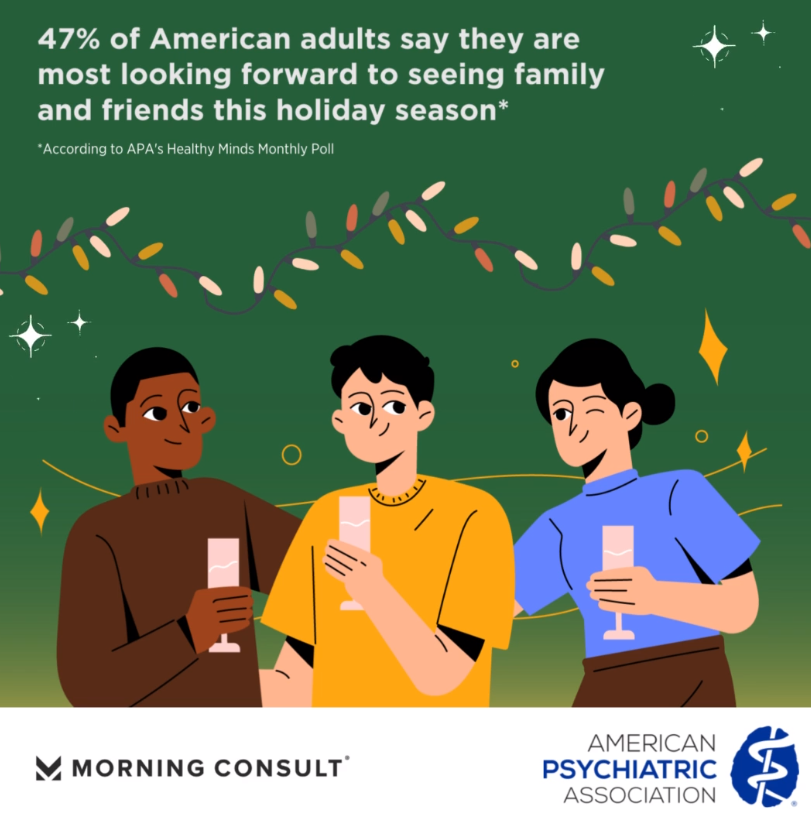A Psychiatrist’s Guide to Surviving Family Gatherings
The Hallmark version of the holiday season portrays a snow-blanketed cozy, warm and loving environment in which we reconnect with friends, family and loved ones, and celebrate the people and events we are thankful for. In fact, in a new poll from the American Psychiatric Association, 47% of Americans say that’s the thing they look forward to the most this holiday season, and, no doubt, it can be joyous.
But for many people, the holidays are far from stress-free, and can even cause anxiety. Whether you overextend to begin with while trying to create the perfect holiday gathering or find yourself in overwhelming holiday traffic or travel delays, stress can put a damper on your holiday season.

One particularly difficult area can be the relationships that we count on to power us through it, and the clashes that may often come when so-called “friendly conversation,” becomes heated, not to mention the added confounding influence that alcohol and social media can have.
Despite the midterm election being behind us, politics may still come up at the dinner table. Conversations addressing polarizing issues can be emotional and contentious, even with family members, and especially if they involve differences over gender identity, race, or other deeply personal issues. Some families enjoy and even look forward to these discussions, but for others, politics are sensitive. In fact, around one in five (19%) Americans report being worried about those conversations.
Americans, and our families, are not a monolithic group, and many of us have different beliefs than our parents or extended family. While some situations are irreconcilable and some estrangements that do occur may be healthy, on balance, many Americans’ relationships exist in gray areas of both positive and challenge. The good news is that there are many ways to manage holiday gatherings and dinners, even when we disagree.
For example, if you find yourself walking into a situation where you are in the political minority and are anxious about a contentious discussion, it can be helpful to have an ally or someone who you trust in your family to help you shift the topic if things get uncomfortable. Conversely, if you’re a family leader, you could have a powerful role for younger family members by modeling conversation and inviting varying perspectives in ways that make everybody feel welcome. When efforts at non-judgmental and diverse dialogue are unsuccessful, shutting down conversations that are causing friction and changing the subject is a good strategy. It’s never wrong to disengage from a conversation with an aggressive person.
Especially with family members, it is important to separate positions from people to avoid bringing old issues into the mix. Focusing on the things that bring you and your family together, rather than your differences, political or otherwise, can be a way to keep things positive if a conversation starts to get out of hand. Everybody likes food: sometimes a secret family recipe can provide respite from rehash and analysis of the latest social media debate.
If you and your family members are competitive in nature and you also dread bickering over your lawmakers’ views on climate change, try challenging each other to see who can go the longest without mentioning anything political. You can even up the ante for not talking about politics by adding in prizes – at the very least the competition can be a momentary diversion from the political elephant in the room. Planning out a group activity can be another way to shift everyone’s focus from politics to having fun, living in the moment, and celebrating your shared history. These strategies can help keep the atmosphere light and help bring family members closer together.
The holiday season can be uplifting but also chaotic and disruptive for many reasons. In life, even positive events often cause stress. We all benefit by remembering to take care of ourselves, respecting each other and ourselves, understanding that we all have roles in creating ways of avoiding painful conflict, and keeping a realistic – not idealistic – view of what the holidays entail. It can help to focus on gratitude for the people that have made a meaningful and positive difference in your life or of whom you have warm memories of past seasons. And if there are reasons that taking on family gatherings or other celebrations are just not in the cards this year, it is okay to opt out and do something different. And, if you’re the head of the family, leader, or host, don’t be insulted if someone or everyone needs space. Maybe this year the family celebration will come at another time … you could consider Arbor Day, instead.
